初中英语易混淆地词语
初中英语易混淆词汇总结精华(打印背诵版)
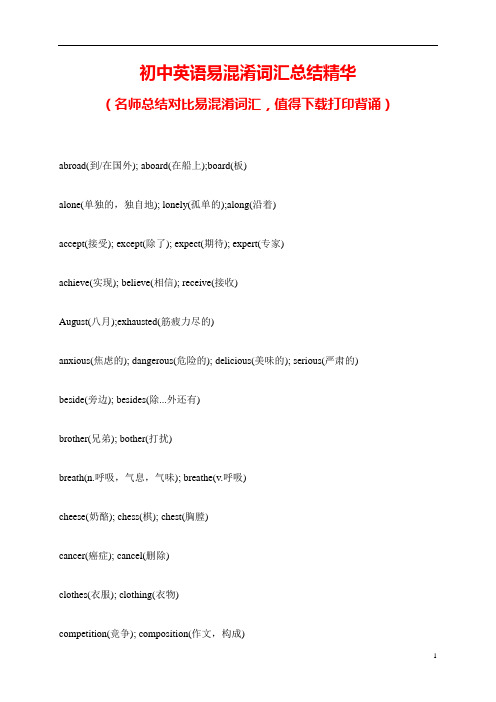
初中英语易混淆词汇总结精华(名师总结对比易混淆词汇,值得下载打印背诵)abroad(到/在国外); aboard(在船上);board(板)alone(单独的,独自地); lonely(孤单的);along(沿着)accept(接受); except(除了); expect(期待); expert(专家)achieve(实现); believe(相信); receive(接收)August(八月);exhausted(筋疲力尽的)anxious(焦虑的); dangerous(危险的); delicious(美味的); serious(严肃的) beside(旁边); besides(除...外还有)brother(兄弟); bother(打扰)breath(n.呼吸,气息,气味); breathe(v.呼吸)cheese(奶酪); chess(棋); chest(胸膛)cancer(癌症); cancel(删除)clothes(衣服); clothing(衣物)competition(竞争); composition(作文,构成)confusing(混乱的); fascinating(迷人的); frustrating(令人沮丧的);convincing(有说服力的) chop (砍); shop(商店,购物)create(创造); creative(有创造力的); creature(生物)chicken(鸡); kitchen(厨房);children(孩子)chose(选择) ; chase(追逐)costume(服装); custom(文化);customer(顾客)crow(乌鸦) ;clown(小丑); cow(奶牛)dessert(甜点); desert(沙漠)dollar(美元); similar(相似的); familiar(熟悉的); guitar(吉他)dining-room(食堂); dinning(喧闹); dinner(晚餐)dare(敢); dairy(日记); fairly(公平地); hair(头发); pair(双,对)destory(毁坏); toy(玩具); enjoy(享受,喜欢)decision(决定); direction(方向)double(两倍的); couple(夫妇)except(除了); expect(期待); accept(接受); expert(专家)expect(希望); respect(尊重)early(早地): easily(容易地)energy(能量); energetic(精力充沛的); engineer(工程师) entertainment(娱乐); environment(环境)especially(特别,尤其);particularly(格外);specially(特殊地) expensive(昂贵的);experience(经验); experiment(实验) express(表达); impress(使印象深刻); press(按压) electronic(电子的);comic(滑稽的);magic(魔术)floor(地板); flour(面粉);flower(花朵)fight(打架); flight(飞行)fruit(水果); unit(单元); guitar(吉他); guide(指导); suit(套装) great(好的);greet(打招呼)guess(猜); guest(客人)heard(听); heart(心); heat(高温) ; head(头)furniture(家具); future(未来); gesture(手势);temperature(温度); true(真的); nature(自然) hid(藏); hit(击打)hill(小山丘);hall(厅堂); kill(杀害)hold(拿住); hole(洞)instrution(指导); instrument(工具,乐器) invent(发明); invite(邀请)later(稍后); latest(最近的) ; lately(最近)lead(领导); leaf(叶子)land(陆地); lend(借给)litter(垃圾); little(小/少的); letter(信件)line(线); lion(狮子)lie-lay-lain(躺),(位于); lay-laid-laid(下蛋) march(行军); match(比赛,搭配)metal(金属); medal(奖牌); model(模型,模特) monkey(猴子); donkey(驴)national(国家的,民族的); natural(自然的) ninth(第九); ninety(第九十)offer(提供); officer(官员)outgoing(外向的); outstanding(杰出的) purpose(目的); suppose(期待)pass(通过); past(过去的); post(邮寄) plane(飞机); planet(小行星); plant(植物) pool(水池); poor(贫穷的)quite(十分,非常); quiet (安静的)regard(视为); regret(后悔)remain(保持); remind(提醒)repeat(重复); report(报道)raise(筹集); rise(上升); rose【名词】(玫瑰) rain(雨);pain(疼痛); lain(躺)seem(似乎); seen(看见)send(发送):sand(沙子)single(单个的); simple(简单的)soup(汤); soap(肥皂)sour(酸的); tour(旅游)street(街道); strict(严格的); secret(秘密)succeed(成功v.); success(成功n.)support(支持); suppose(假定); surprise(惊喜)supper(晚餐); super(超级的)tower(塔); towel(毛巾)till(直到); until(直到)value(价值); volunteer(志愿)specific(具体的); energetic(有活力的);fantastic(极好的) socks(袜子); stockings(长筒袜)stick(坚持,棍); strict(严格的)story(故事); store(商店)sweet(甜的); sweat(汗); sweep(擦) through(通过); although(尽管)。
人教版初中英语易混淆单词短语总结

vocabulary n. (可数名)by mistake地word n.;by accident有时地,不测处aloud adv. 作声地;大声地comma n.逗号(非常,反: quietly;silently)period n.句号loudly adv. 大声地;吵地question mark n. 号loud adv. 响亮地adj. 喧的;响亮的challenge n.挑 ( 复数 challenges)vt.挑pronounce vt . 拼;音pronunciation n. 音法;拼法specific adj.明确的;详细的specifi cally adv. 明确地;详细地special adj.特别的;特的specially adv. 地;特地especially adv. 特;特别;分外particular adj.非一般的;特的;特别的particularly adv. 特别;特地;特别地memorize vt.起来;熟;回起memorization n. ;回grammar n. 法grammatically adv. 法地;从法角度来,add A to B把A增添/充到B中add up to +数目达到⋯spoken English英口make a mistake = make mistakes solution.n. 解决方案;解答solve v. 解决later adv. 此后;一会此后late adj .晚;adv. 晚;lately adv. 近来;近来latest adj.最新的realize v.意到;(某人)(梦想)Eg: Finally, Kelsy realized her dream.come true (某人的梦想)Eg: Finally, her dream came true.matter vi.起重要作用;要Eg: I know Charles doesn't think this project is important, but it matters to me.afraid = terrified adj.惧怕的;愁的be afraid of ... = be terrified of ⋯恐惧 / 惧怕⋯be afraid to do = be terrified to do恐惧/惧怕做⋯laugh at⋯= make fun of⋯讥笑/嘲讽⋯complete vt.达成adj.完好的;完好的completely adv 完好地childhood n. 童年on duty班;日break off忽然中断;中断break down抛;出缺点break up分手take a ride兜take care小心,注意;珍重sb.be sure of sth.sb. be sure to do sth.sb. Be sure that⋯it is certain(无疑;确立) thatcertain adj.某,某些,某个Eg:friendly的比是friendlier,最高是friendliestcomic n.漫画,画志patient adj.耐心的n.病人patiently adv. 耐心地at the end of⋯in the endtake pride in⋯= be proud of⋯with pleasure能够用来答方的求,Eg: “Would you mind holding the door open forme, please ” “Oh, with pleasure.”It ’ s a pleasure.或It’s my pleasure.是用往返答感的答。
英语中考牢记20组易混易错词语辨析
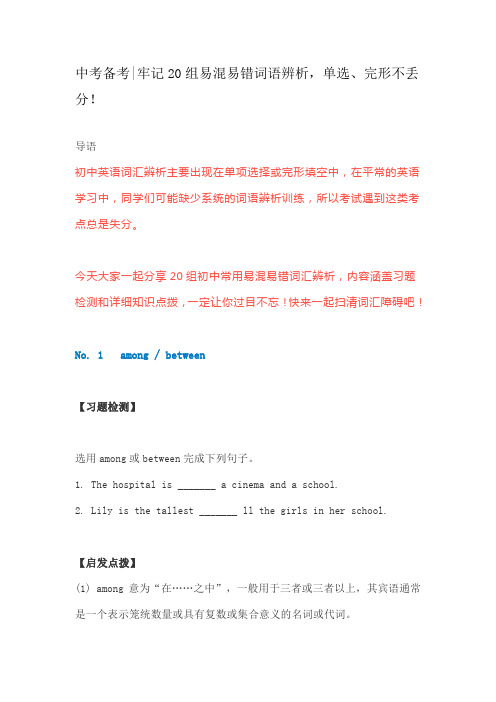
中考备考|牢记20组易混易错词语辨析,单选、完形不丢分!导语初中英语词汇辨析主要出现在单项选择或完形填空中,在平常的英语学习中,同学们可能缺少系统的词语辨析训练,所以考试遇到这类考点总是失分。
今天大家一起分享20组初中常用易混易错词汇辨析,内容涵盖习题检测和详细知识点拨,一定让你过目不忘!快来一起扫清词汇障碍吧!No. 1 among / between【习题检测】选用among或between完成下列句子。
1. The hospital is _______ a cinema and a school.2. Lily is the tallest _______ ll the girls in her school.【启发点拨】(1) among意为“在……之中”,一般用于三者或三者以上,其宾语通常是一个表示笼统数量或具有复数或集合意义的名词或代词。
(2) between一般指两者之间,其宾语通常是表示两者概念的名词或代词,或由and连接的两个具体的人或物。
between有时也可表示多者之中的“两两之间”。
如:Switzerland lies between France, Germany, Austria and Italy.Key:1. between2. amongNo. 2 lay / lie【习题检测】用lay或lie的适当形式完成句子。
1. I _______ the table when my mother cooked the meal.2. John was ill and _______ in bed all morning.【启发点拨】(1) lay作动词,可意为“摆放(餐桌)”,其过去式与过去分词均为laid,现在分词为laying,常用于短语lay the table,意为“摆放餐桌”。
如:Tom was laying the table.(2) lie作动词,意为“躺;平躺”时,过去式为lay,过去分词为lain,现在分词为lying。
初中基础单词容易混淆的词汇
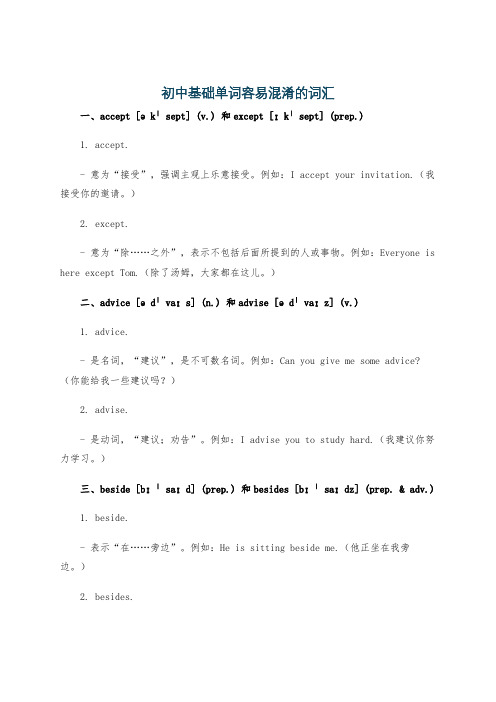
初中基础单词容易混淆的词汇一、accept [əkˈsept] (v.) 和except [ɪkˈsept] (prep.)1. accept.- 意为“接受”,强调主观上乐意接受。
例如:I accept your invitation.(我接受你的邀请。
)2. except.- 意为“除……之外”,表示不包括后面所提到的人或事物。
例如:Everyone is here except Tom.(除了汤姆,大家都在这儿。
)二、advice [ədˈvaɪs] (n.) 和advise [ədˈvaɪz] (v.)1. advice.- 是名词,“建议”,是不可数名词。
例如:Can you give me some advice?(你能给我一些建议吗?)2. advise.- 是动词,“建议;劝告”。
例如:I advise you to study hard.(我建议你努力学习。
)三、beside [bɪˈsaɪd] (prep.) 和besides [bɪˈsaɪdz] (prep. & adv.)1. beside.- 表示“在……旁边”。
例如:He is sitting beside me.(他正坐在我旁边。
)2. besides.- 作介词时,意为“除……之外(还有)”;作副词时,意为“而且;此外”。
例如:Besides English, we also learn French.(除了英语,我们还学法语。
);I don't like this dress. Besides, it's too expensive.(我不喜欢这条裙子。
而且,它太贵了。
)四、borrow [ˈbɒrəʊ] (v.) 和lend [lend] (v.)1. borrow.- 意为“借入”,常用搭配borrow sth. from sb.。
例如:I borrow a book from the library.(我从图书馆借了一本书。
初中生易混淆的单词 以及 新标准英语单词

初中生易混淆单词1)abroad 国外aboard 上(船,飞机)2) affect v 影响, 假装effect n 结果, 影响3) widow 寡妇window 窗户4) drawn draw 过去分词drown 溺水5) dairy 牛奶厂diary 日记6) contend 奋斗, 斗争content 内容, 满足的context 上下文contest 竞争, 比赛7) suite 一(套,批) suit一套衣服8) implicit 含蓄的explicit 明白的9) dessert 甜食desert 沙漠v 放弃dissert 写论文10) pat 轻拍tap 轻打slap 掌击rap 敲,打11) decent 正经的descent n 向下, 血统descend v 向下12) sweet 甜的sweat 汗水13) later 后来latter 后者latest 最近的lately adv 最近14) costume 服装custom 习惯15) extensive 广泛的intensive 深刻的16) aural 耳的oral 口头的17) quite 相当quiet 安静地18) altar 祭坛alter 改变19) assent 同意ascent 上升accent 口音20) champion 冠军champagne 香槟酒campaign 战役21) baron 男爵barren 不毛之地的barn 古仓22) beam 梁,光束bean 豆been have 过去式23) precede 领先proceed 进行,继续24) pray 祈祷prey 猎物25) chicken 鸡kitchen 厨房26) monkey 猴子donkey 驴27) chore 家务活chord 和弦cord 细绳28) cite 引用site 场所sight 视觉29) clash (金属)幢击声crash 碰幢,坠落crush 压坏30) compliment 赞美complement 附加物31) confirm 确认conform 使顺从32) contact 接触contract 合同contrast 对照33) council 议会counsel 忠告consul 领事34) crow 乌鸦crown 王冠clown 小丑cow 牛35) dose 一剂药doze 打盹36) angel 天使angle 角度37) emigrant 移民到国外immigrant 从某国来的移民38) excess n 超过exceed v超过excel 擅长39) hotel 青年旅社hostel 旅店40) latitude 纬度altitude 高度gratitude 感激41) immoral 不道德的immortal 不朽的42) lone 孤独的alone 单独的lonely 寂寞的43) mortal 不死的metal 金属mental 神经的medal 勋章model 模特meddle 玩弄44) scare 惊吓scarce 缺乏的45) drought 天旱draught 通风, 拖拉draughts (英)国际跳棋47) assure 保证ensure 使确定insure 保险48) except 除外expect 期望accept 接受excerpt 选录exempt 免除49) floor 地板flour 面粉50) incident 事件accident 意外51) inspiration 灵感aspiration 渴望52) march 三月, 前进match 比赛53) patent 专利potent 有力的potential 潜在的54) police 警察policy 政策politics 政治55) protest 抗议protect 保护56) require 需要inquire 询问enquire 询问acquire 获得67) revenge 报仇avenge 为...报仇68) story 故事storey 楼层store 商店69) strike 打stick 坚持strict 严格的70) expand 扩张expend 花费extend 延长71) commerce 商业commence 开始72) through 通过thorough 彻底的(al)though 尽管thought think 过去分词73) purpose 目的suppose 假设propose 建议74) expect 期望respect 尊敬aspect 方面inspect 视察suspect 怀疑75) glide 滑翔slide 使滑行slip 跌落76) steal 偷steel 钢77) strive 努力stride 大步走78) allusion 暗示illusion 幻觉delusion 错觉elusion 逃避79) prospect 前景perspective 透视法80) stationery 文具stationary 固定的81) loose 松的lose 丢失loss n 损失lost lose过去式82) amend 改正, 修正emend 校正83) amoral unmoral immoral 同义不道德的84) capitol 大厦capital 首都85) casual 随便的causal 表原因的86) extend 延伸extent 长度extant 现存的87) inability 没能力disability 残疾88) personnel 人事personal 个人的89) statue 塑像statute 法令stature 身长status 地位90) adapt 适应adopt 采用adept 内行91) socks 短袜stockings 长筒袜92) tax 税taxi 出租93) definite 不定的infinite 无限的94) grim 严酷的grime 污点95) crayon 蜡笔canyon 山谷96) recent 最近resent 生气97) phrase 短语phase 阶段98) mission 使命emission 散发, 发射mansion 大厦99) vision 视觉version 译本100) gasp 上气不接下气grasp 抓住101) delicate 微妙的dedicate 献身102) induce 促使,劝诱deduce 推测reduce 减少seduce 诱使103) lapse 流逝elapse 消逝eclipse 日食104) rude 粗鲁的crude 天然的105) source 水源sauce 酱油saucer 茶托resource 资源recourse 求援106) sled (儿童)雪橇sledge 雪橇107) stripe 条纹strip 条trip 旅行108) vocation 职业vacation 假期evocation 召集revocation 撤回109) ardor 热情adore 崇拜adorn 装饰110) area 区域era 时代111) resemble 象... assemble v 集合,装配assembly n 集合, 装配112) assume 假定resume 恢复113) attain 达到obtain 获得abstain 放弃114) award 授予reward 奖赏115) baggage (American English) luggage 行李116) badge 徽章bandage 绷带117) blade 刀刃bald 秃的bold 大胆118) bloom 开花blossom 开花(结果实) bosom 胸口119)blush 脸红flush 发红(脸)120) bride 新娘bribe 贿赂121) growl 咆哮howl 狼叫122) depress 使沮丧suppress 镇压oppress 压迫123) dime 一角dim 暗淡的124) dizzy 眼花缭乱dazzle 使眼花125) brown 褐色brow 眼眉blow 打击126) bullet 子弹bulletin 公告127) carton 纸板盒cartoon 动画128) chivalry 骑士精神cavalry 骑兵队129) collar 领子cellar 地窖color 颜色130) vanish 消失evanish 使消失131) intrude 入侵extrude 逐出detrude 推下132) contort 扭弯distort 弄弯retort 反驳133) eminent 杰出的imminent 逼近的134) decline 下降recline 放置incline 倾斜135) exclaim 呼喊proclaim 宣布acclaim 欢呼declaim136) edict 法令indict 控告137) perfuse 泼洒profuse 浪费的138) reject 拒绝eject 逐出inject 注射deject 使沮丧139) literacy 识字literary 文学的literature 文学literal 文字的140) median 中央的,中线的medium 媒体141) expel 驱逐repel 反击impel 推动dispel 驱散142) rip 撕ripe 熟的143) wench 绞车wrench 扭伤144) confidant 知己confident 有信心的145) dine 吃饭diner 吃饭人dinning n 吃饭dinner 晚饭146) dreg 渣滓drag 拖拉147) faint 失去知觉feint 佯攻148) imprudence 轻率impudence 无耻149) specie 硬币species 种类150) hanger 钩子hangar 棚厂hunger 饥饿151) principal 校长, 主要的principle 原则152) idle 空闲的idol 偶像新课标初中英语单词1. a (an) art. 一;一个2. ability n 能力3. able a 能4. about prep & ad. 大约,关于5. above prep 上方,以上6. abroad a & ad 外国7. absent a 缺席8. accent n 口音;腔调9. accept v 接受;承担;同意10. accident n 根据11. ache n 疼12. achieve v 完成;实现13. across prep 穿越14. act n & v 表演15. action n 动作16. active a 积极的17. activity n 活动18. add v 增加19. address n 地址20. advantage n 优点21. advertisement n 广告22. advice n 建议23. advise v 建议24. afford v 提供;担负得起25. afraid a 怕,害怕26. after ad , prep & conj 在……以后27. afternoon n 下午28. again ad 又;再29. against prep 反对30. age n 年龄;年纪31. ago ad 以前32. agree v 同意33. agreement n 同意34. air n 空气35. airline 航线36. airplane n 飞机37. airport n 飞机场38. alive a 活的;活泼的39. all a & pron 全部;所有40. allow v 允许41. almost ad 几乎;差不多42. alone a 单独;独自43. along ad & prep 沿着44. aloud ad 大声地45. already ad 已经46. also ad 也47. although conj 虽然48. always ad 总是49. America n 美国;美洲50. American a & n 美国的;美洲的51. among prep 在……中间(之中)52. ancient a 古代的;古老的53. and conj 和54. angry a 生气55. animal n 动物56. another a & pron 另;另一57. answer n & v 回答58. ant n 蚂蚁59. any pron & a 任何60. anybody pron 任何人;有人61. anyone pron 任何人;无论谁62. anything pron 任何事;物某事63. anyway ad 不管怎样;无论如何64. anywhere ad 无论何地;任何地方;65. appear v 出现66. apple n 苹果67. April n 四月68. area n 地区69. arm n 手70. army n 军队;陆军71. around prep & ad 围绕;绕过72. arrive v 到达;达到73. art n 艺术;技术74. article n 文章;冠词75. as ad, conj & prep 当;像76. Asia n 亚洲;亚洲人77. Asian a & n 亚洲人;亚洲的78. ask v 问;要求;请求79. asleep a 睡熟的;睡着的80. at prep 在;对81. Atlantic n & a 大西洋;大西洋的82. attention n 注意;关怀;关心83. August n 八月。
中考易混淆单词
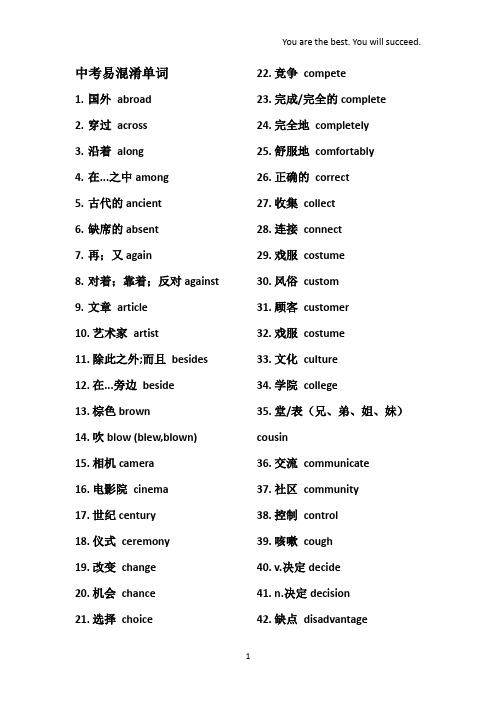
You are the best. You will succeed.中考易混淆单词1.国外abroad2.穿过across3.沿着along4.在...之中among5.古代的ancient6.缺席的absent7.再;又again8.对着;靠着;反对against9.文章article10.艺术家artist11.除此之外;而且besides12.在...旁边beside13.棕色brown14.吹blow (blew,blown)15.相机camera16.电影院cinema17.世纪century18.仪式ceremony19.改变change20.机会chance21.选择choice 22.竞争compete23.完成/完全的complete24.完全地completely25.舒服地comfortably26.正确的correct27.收集collect28.连接connect29.戏服costume30.风俗custom31.顾客customer32.戏服costume33.文化culture34.学院college35.堂/表(兄、弟、姐、妹)cousin36.交流communicate37.社区community38.控制control39.咳嗽cough40.v.决定decide41.n.决定decision42.缺点disadvantageYou are the best. You will succeed.43.挖dig(dug, dug)44.邀请invite45.发明invent46.邀请invitation47.发明invention48.分开divide49.电electricity50.电的electric51.电子的elcetronic52.实验experiment53.经验;经历experience54.尤其;特别especially55.确切地exactly56.极好的;优秀的excellent57.除了except58.期望expect59.表达express60.表现behave61.表扬perform62.渔夫fisherman63.第四fourth64.十四fourteen 65.第四十fortieth66.法语/法国人的French67.法国France68.外国人foreigner69.花园garden70.地理geography71.毕业graduate72.逐渐地gradually73.大体的general74.客人guest75.门卫;士兵guard76.导游guide77.德语/德国人的German78.德国Germany79.习惯habit80.爱好hobby81.幽默的humorous82.高度height83.重量weight84.加热heat85.心脏heart86.拥抱hug(hugged,hugged)87.隐藏hide(hid,hidden)88.放;下(蛋)lay( laid, laid)89.躺lie (lay, lain)90.撒谎(lied,lied)91.邀请invite92.发明invent93.产业;工业industry94.面试;采访interview95.介绍introduction96.指示;指令instruction97.立刻immediately98.日语/日本人的Japanese99.模型model100.中间的middle101.嘴巴mouth102.月month103.老鼠mouse104.钱money105.猴子monkey106.奖牌medal107.铁的metal108.精神上的mental 109.医学的medical110.药medicine111.机器machine112.材料material113.第九ninth114.九十ninety115.(两者)都不neither 116.(三者以上)都不none 117.第九十ninetieth 118.乘客passenger119.段落/走廊passage 120.合适地properly121.可能地possibly122.可能地probably123.承诺promise124.产品product125.英镑pound126.骄傲的proud127.骄傲n. pride128.小学生pupil129.紫色purple130.价格price131.奖品prize132.表扬;赞扬praise 133.星球planet134.种植/植物plant 135.荣幸;快乐pleasure 136.完美的perfect 137.耐心的patient 138.有礼貌的polite 139.飞行员pilot140.准备prepare 141.更喜欢prefer 142.预防prevent 143.保护protect144.污染pollute145.生产v. produce 146.过程n.process 147.十分quite148.安静的quiet 149.收到receive150.意识到realize 151.提醒remind152.复习,回顾review 153.害怕的(形容人)scared 154.害怕的(形容物)scary 155.酸的sour156.咸的salty157.糖sugar158.卖;销售n.sale159.卖;销售V.sell160.v.服务serve161.n.服务service162.n.仆人servant163.围巾scarf164.分离separate165.小吃,零食snack 166.蛇snake167.标准standard168.严格的strict169.严肃的,认真的serious 170.象征symbol171.标志sign172.社会society173.社会的social174.偷steal(stole, stolen)175.摇晃shake(shook,shaken) 176.传播spread177.速度speed178.猜想;设想suppose 179.支持support180.建议suggest181.成功v.succeed182.成功n.success183.通过through184.虽然though/although 185.扔throw (threw, thrown) 186.周二Tuesday187.周四Thursday188.十三thirteen189.三十thirty190.十二twelve191.第十二twelfth192.朝;向toward(s)=to 193.向前forward194.厕所toilet195.珍宝treasure196.雨伞umbrella 197.大学university 198.参观者visitor 199.视频;录像video 200.周三Wednesday 201.天气weather 202.是否whether。
初中英语易混淆短语
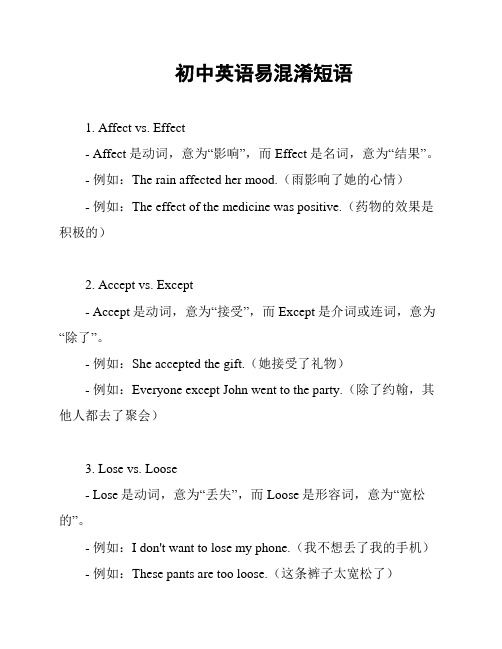
初中英语易混淆短语1. Affect vs. Effect- Affect是动词,意为“影响”,而Effect是名词,意为“结果”。
- 例如:The rain affected her mood.(雨影响了她的心情)- 例如:The effect of the medicine was positive.(药物的效果是积极的)2. Accept vs. Except- Accept是动词,意为“接受”,而Except是介词或连词,意为“除了”。
- 例如:She accepted the gift.(她接受了礼物)- 例如:Everyone except John went to the party.(除了约翰,其他人都去了聚会)3. Lose vs. Loose- Lose是动词,意为“丢失”,而Loose是形容词,意为“宽松的”。
- 例如:I don't want to lose my phone.(我不想丢了我的手机)- 例如:These pants are too loose.(这条裤子太宽松了)4. Principal vs. Principle- Principal是名词,意为“校长”或“主要的”,而Principle是名词,意为“原则”。
- 例如:The principal greeted the students in the morning.(校长在早晨向学生们致意)- 例如:He believed in the principles of honesty and integrity.(他相信诚实和正直的原则)5. Site vs. Sight vs. Cite- Site是名词,意为“地点”或“场所”,Sight是名词,意为“视力”或“景色”,而Cite是动词,意为“引用”。
- 例如:They chose a beautiful site for their picnic.(他们选择了一个美丽的野餐地点)- 例如:Her sight has been deteriorating.(她的视力一直在恶化)- 例如:He cited several sources in his research paper.(他在研究论文中引用了几个来源)这些是初中英语中容易混淆的一些短语,希望对你有帮助。
(完整版)初中常见易混淆英语词汇

1.sound, voice, noisesound自然界各种各样的声音,voice人的嗓音,noise噪音I hate the loud noise outside.2. exercise, exercises, practiceexercise运动,锻炼(不可数),exercises练习(可数),practice(反复做的)练习take exercise 做运动3. work, job二者均指工作。
work不可数,job可数a good job,What interesting work it is!4. cook, cookercook厨师,cooker厨具He is a good cook.5. police, policemanpolice警察的总称,后接复数谓语动词,policeman 指某个具体的警察The police are questioning everyone in the house.6. problem, questionproblem常和困难联系,前面的动词常为think about, solve, raise,question常和疑问联系,多和ask, answer连用7. price, prizeprice价格,prize奖,奖品,奖金win the first prize The price is high/low.8. a number of, the number ofa number of许多,谓语动词用复数。
the number of…的数目,谓语动词用单数。
The number of students is increasing.9. in front of, in the front ofin front of范围外的前面,in the front of范围内的前面A boy sits in the front of the room.10. next year, the next yearnext year将来时间状语,the next year过去将来时间状语He said he would go abroad the next year.11. in bed, on the bedin bed卧在床上,on the bed在床上The book is on the bed. He is ill in bed.12. the people, a peoplethe people指人,a people指民族The Chinese is a peace-loving people.13. it, oneit同一物体,one同类不同一I lost my pen. I have to buy a new one.14. that, thisthat指代上文所提到的,this导出下文所要说的I was ill. That's why…15. none, nothing, no onenone强调有多少,nothing, no one强调有没有,nothing指物,no one指人--- How many…/How much…? --- None.16. anyone, any oneanyone指人,不能接of,any one指人/物均可,可接of, any one of you17. who, whatwho指姓名或关系,what指职业或地位What is your dad? He is a teacher.18. what, whichwhat的选择基础是无限制的,which在一定范围内进行选择Which do you prefer, bananas or apples?19. other, anotherother后接名词复数,another后接名词单数other students, another student20. many, much, a lot ofmany和可数名词连用,much和不可数名词连用,a lot of可数,不可数均可,但不用于否定句I haven't many books.21. much more…than, many more…thanmuch more…than后接形容词或不可数名词,many more…than后接可数名词many more people, much more water, much more beautiful22. no, notno=not a/any, no friend=not a/any friend, no water=not any water23. by oneself, for oneself, to oneselfby oneself单独的,独自的,for oneself为自己,to oneself供自己用的24. at all, after allat all根本,全然, after all到底,毕竟After all he is a child.25. tall, hightall常指人或动物,high常指物体He is tall.26. fast, quicklyfast侧重于指人或物体具有运动速度快的特点,quickly侧重指某事完成或发生的快run fast, answer the question quickly27. high, highlyhigh具体的高,highly抽象的高,高度的think highly of(高度赞扬)28. sleeping, asleep, sleepysleeping正在睡觉,asleep睡着,熟睡,只能做表语,sleepy困的,有睡意的a sleeping baby,The baby is asleep. I'm sleepy.29. real, truereal真的,真实的,指的是事实上存在而不是想象的,true真的,真正的,指的是事实和实际情况相符合real gold, a true story30. pleasant, pleased, pleasingpleasant常用作定语,pleased常用作表语,pleased主语常为人,a pleasant trip,be pleased with…对…感到满意/开心31. ill, sickill做表语,sick定语、表语均可a sick boy, He is sick/ill.32. good, wellgood形容词,well副词,但指身体状况是形容词He is well again.33. hard, hardlyhard努力,hardly几乎不work hard, I can hardly believe it.34. excited, excitingexcited使人兴奋的,exciting令人兴奋的I'm excited. The news is exciting.35. before long, long beforebefore long不久以后,long before很久以前36. happy, gladhappy高兴,幸福,定表均可,glad高兴,只能做表语a happy girl, I’m happy/ glad to see you.37. instead, instead ofinstead是副词,放在句首或句末,instead of是介词短语,放在句中He didn't see a film. Instead he watched TV. He watched TV instead of seeing a film.38. too much, much tootoo much 后接不可数名词,much too后接形容词much too heavy39. raise, riseraise及物动词,rise不及物动词The sun rises in the east. Raise your hand, please.40. bring, take, carry, fetchbring拿来,take带走,carry随身携带,fetch去回这一往返动作fetch a box of chalk41. spend, take, pay, costspend人做主语,花钱,花时间; s pend…on sth./(in) doing sth; take物做主语,花时间; It takes sb some time to do sth.; pay人做主语,花钱,pay for; cost物做主语,花钱;sth cost some money42. join, join in, take part injoin加入某个组织,并成为其中的一员;join in参加小型的活动, join sb. in;take part in 参加大型的活动He joined the army five years ago.43. learn, studylearn学习,侧重学习的结果,study学习,侧重学习的过程,研究study the problem44. want, hope, wishwant打算,想要,want to do, want sb. to do, hope希望(通常可以实现),hope to do/ hope that… wish希望(通常不能实现)wish (sb.) to do, wish sb/sth. + n. I wish you success.45. answer, replyanswer及物动词,reply不及物动词,后接to, reply to the letter46. leave, leave forleave离开,leave for前往He left Beijing for Shanghai.47. drop, falldrop及物\不及物均可,fall不及物动词Prices fell/dropped. He dropped his voice.48. win, lose, beatwin后接sth.,反义词为lose, beat后接sb. win the game, beat them49. live on, live bylive on以…为主食,live by靠…谋生live on fish/ live by fishing50. catch a cold, have a coldcatch a cold不能和表示"一段时间"的状语连用,而have a cold可以She has had a cold for a week.51. change for, change intochange for调换成,change into变成Change the shirt for a bigger one. Water changes into ice.52. go for a doctor, go to a doctorgo for a doctor去请医生,go to a doctor去看病53. arrive, get, reacharrive不及物动词,后接in (大地点),at(小地点),get不及物动词后接to,reach及物动词arrive in Beijing, get to Beijing, reach Beijing54. agree with, agree to,agree with同意某人,agree to同意某事,agree with you, agree to the plan, agree to do sth55. receive, acceptreceive收到某一东西,但不一定接受,accept接受I received a gift, but I didn't accept it.56. wear, put on, dresswear和dress表状态,wear接衣服等,可用进行时,dress接人,be dressed in, put on表动作It's cold outside. Put on your warm clothes.57. listen, hearlisten强调动作,hear强调结果I listened, but I heard nothing.58. look, see, watchlook看的动作,see看的结果,watch强调所看物体的变化、移动和发展watch TV59. lie, laylie躺,位于(lay, lain),说谎(lied, lied),lay平放(laid, laid) lay the book60. turn, get, growturn表突变,后常接表颜色的词,get强调变的结果,grow强调过程,逐渐的变化turn yellow, get tired, grow big61. close, shut, turn offclose和shut当关解时可以通用,用于可开合的物体,turn off用于指有开关的物体Close/Shut the door. Turn off the TV.62. at, in (表地点)at小地点,in大地点arrive at a small village, arrive in Shanghai63. day after day, day by dayday after day日复一日(无变化);day by day一天天地(有变化)Trees grow taller day by day.64. after, in (表时间)after接时间点,in接时间段,用于将来时after 7:00, in five minutes65. between, amongbetween两者之间,三者或三者以上两两之间, among三者或三者以上之间Switzerland lies between France, Germany, Australia and Italy.66. through, acrossthrough穿越空间,across在…上穿过through the forest, across the desert67. above, on, overabove在上面,不接触,on在上面,接触,over在正上方fly over the hill68. until, not…untiluntil到…为止,not…until直到…才(常跟点动词连用)I waited until 3:00.He didn't come until 3:00.69. besides, exceptbesides除了…还(包括在内)except除了(不包括在内),70. because, because ofbecause连词,连接两句话,because of后接词或短语He didn't go to school because of his illness.71. for example, such asfor example一般只列举一个,such as列举多个例子I have been to a lot of American cities, such as New York, Atlanta and Chicago.72. All right. That's all right. That's right.All right好吧;That's all right.没关系;That's right. 那是对的---Sorry. --- That's all right.73. such…that, so…that当如此…以至于解时,such…that修饰名词,so…that修饰形容词或副词,但名词前面如果有many, much, little, few修饰用so…that,不用such thatso many people that… such a lovely boy=so lovely a boy74. Shall I…? Will you…?Shall I…? 征求对方意见或向对方请示,意为我能…吗? Will you…?请求或建议对方做某事,意为你愿意…吗? Will you help me? Yes, I will.。
中考易拼错单词

中考易拼错单词
一、accommodation [əˌkɒməˈdeɪʃn],名词。
1. 含义:住宿;膳宿。
2. 易错点:容易少写一个“m”或者把“c”和“m”的顺序弄混。
二、embarrassed [ɪmˈbærəst],形容词。
1. 含义:感到尴尬的;难堪的。
2. 易错点:容易写成“embarrass”(动词)或者拼写时少字母,如写成“embarased”。
三、separate。
- 作动词 [ˈsepəreɪt]:分离;分开。
- 作形容词 [ˈseprət]:单独的;分开的。
1. 易错点:作动词时,容易忘记“a”后面的“r”;作形容词时,容易与动词形式混淆。
四、believe [bɪˈliːv],动词。
1. 含义:相信;认为。
2. 易错点:容易写成“beleive”,将“ie”顺序弄反。
五、receive [rɪˈsiːv],动词。
1. 含义:收到;接到。
2. 易错点:容易写成“recieve”,把“ei”顺序写错。
六、necessary [ˈnesəsəri],形容词。
1. 含义:必要的;必需的。
2. 易错点:容易写成“neccessary”,多写一个“c”。
七、government [ˈɡʌvənmənt],名词。
1. 含义:政府。
2. 易错点:容易写成“goverment”,少写一个“n”。
八年级下册英语单词重点易错
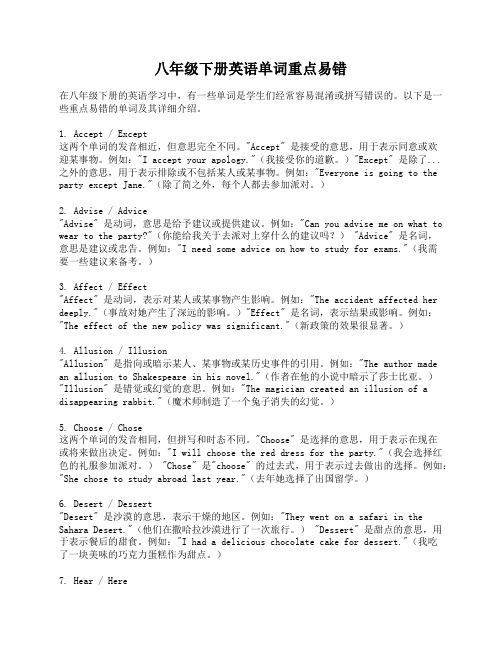
八年级下册英语单词重点易错在八年级下册的英语学习中,有一些单词是学生们经常容易混淆或拼写错误的。
以下是一些重点易错的单词及其详细介绍。
1. Accept / Except这两个单词的发音相近,但意思完全不同。
"Accept" 是接受的意思,用于表示同意或欢迎某事物。
例如:"I accept your apology."(我接受你的道歉。
)"Except" 是除了...之外的意思,用于表示排除或不包括某人或某事物。
例如:"Everyone is going to the party except Jane."(除了简之外,每个人都去参加派对。
)2. Advise / Advice"Advise" 是动词,意思是给予建议或提供建议。
例如:"Can you advise me on what to wear to the party?"(你能给我关于去派对上穿什么的建议吗?) "Advice" 是名词,意思是建议或忠告。
例如:"I need some advice on how to study for exams."(我需要一些建议来备考。
)3. Affect / Effect"Affect" 是动词,表示对某人或某事物产生影响。
例如:"The accident affected her deeply."(事故对她产生了深远的影响。
)"Effect" 是名词,表示结果或影响。
例如:"The effect of the new policy was significant."(新政策的效果很显著。
)4. Allusion / Illusion"Allusion" 是指向或暗示某人、某事物或某历史事件的引用。
初级中学英语易混淆的词语

初中英语易混淆的词语affect/effect1)affect——affected——affected及物动词对…影响,感动(人的)心,使感动例句:①The noise from the street affected our study.(马路上的噪音影响我们学习。
)②Her story affected us deeply.beat/hit/strike1)beat——beat——beaten(连续地)打;击败;(心)跳动例句:①My heart is beating fast.(我的心跳得很快。
)②They beat us in the match.(在这次比赛中,他们把我们击败了。
)③The rain was beating on the windows.(雨点敲打着窗子。
)2)hit 打;击中;想出(后接on)例句:①The football hit him in the eye.(足球打在他的眼睛上了。
)②He hit on a good idea.(他想出了一个好主意。
)③He hit his head hard on the floor when he fell down.(当他倒下时,头重重地碰到地板上。
)3)strike——struck——struck打;敲;打动(心);擦(火柴);报时;突然想到,用途较广。
例句:①Strike while the iron is hot.(趁热打铁。
)②Don't strike the man with a stick.(不要用棒子打那个男人。
)join/join in/take part in/attend1)join及物动词加入(团体,组织,参军)、同……一起干或玩、连接例句:①I joined the Party in 1975.(我1975年入党。
)②His brother joined the army two years ago.(两年前他哥哥参军。
初中易混淆单词汇总
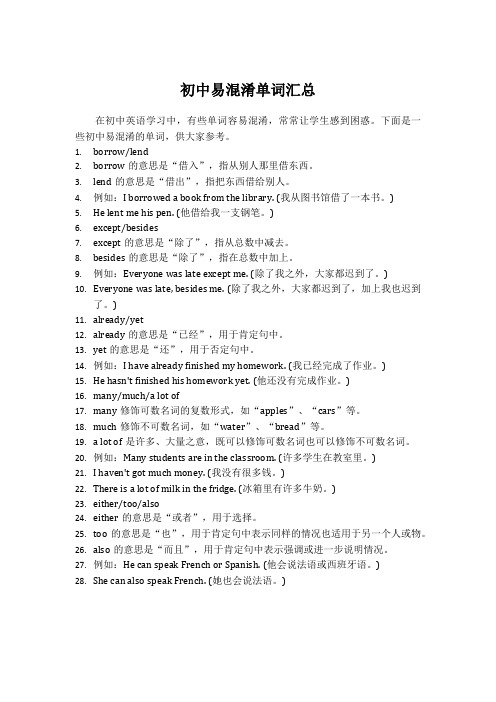
初中易混淆单词汇总在初中英语学习中,有些单词容易混淆,常常让学生感到困惑。
下面是一些初中易混淆的单词,供大家参考。
1.borrow/lend2.borrow的意思是“借入”,指从别人那里借东西。
3.lend的意思是“借出”,指把东西借给别人。
4.例如:I borrowed a book from the library. (我从图书馆借了一本书。
)5.He lent me his pen. (他借给我一支钢笔。
)6.except/besides7.except的意思是“除了”,指从总数中减去。
8.besides的意思是“除了”,指在总数中加上。
9.例如:Everyone was late except me. (除了我之外,大家都迟到了。
)10.Everyone was late, besides me. (除了我之外,大家都迟到了,加上我也迟到了。
)11.already/yet12.already的意思是“已经”,用于肯定句中。
13.yet的意思是“还”,用于否定句中。
14.例如:I have already finished my homework. (我已经完成了作业。
)15.He hasn't finished his homework yet. (他还没有完成作业。
)16.many/much/a lot of17.many修饰可数名词的复数形式,如“apples”、“cars”等。
18.much修饰不可数名词,如“water”、“bread”等。
19. a lot of是许多、大量之意,既可以修饰可数名词也可以修饰不可数名词。
20.例如:Many students are in the classroom. (许多学生在教室里。
)21.I haven't got much money. (我没有很多钱。
)22.There is a lot of milk in the fridge. (冰箱里有许多牛奶。
常见英语易混淆单词大全
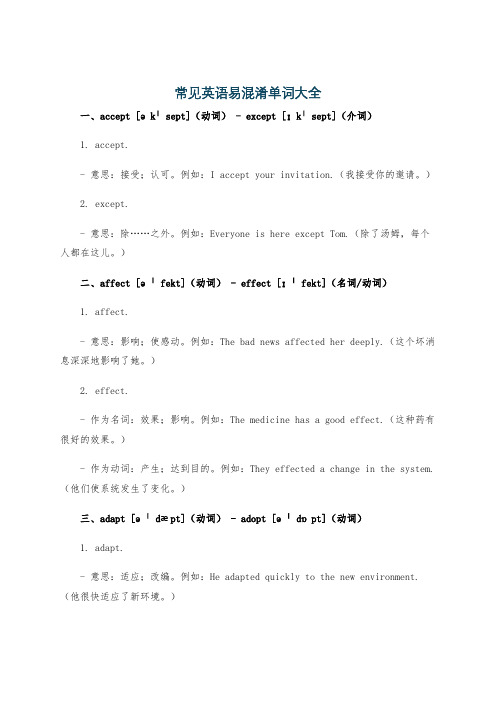
常见英语易混淆单词大全一、accept [əkˈsept](动词) - except [ɪkˈsept](介词)1. accept.- 意思:接受;认可。
例如:I accept your invitation.(我接受你的邀请。
)2. except.- 意思:除……之外。
例如:Everyone is here except Tom.(除了汤姆,每个人都在这儿。
)二、affect [əˈfekt](动词) - effect [ɪˈfekt](名词/动词)1. affect.- 意思:影响;使感动。
例如:The bad news affected her deeply.(这个坏消息深深地影响了她。
)2. effect.- 作为名词:效果;影响。
例如:The medicine has a good effect.(这种药有很好的效果。
)- 作为动词:产生;达到目的。
例如:They effected a change in the system.(他们使系统发生了变化。
)三、adapt [əˈdæpt](动词) - adopt [əˈdɒpt](动词)1. adapt.- 意思:适应;改编。
例如:He adapted quickly to the new environment.(他很快适应了新环境。
)- 例如:They adapted the novel for the film.(他们把这部小说改编成电影。
)2. adopt.- 意思:采用;收养。
例如:We should adopt a new method.(我们应该采用一种新方法。
)- 例如:They decided to adopt an orphan.(他们决定收养一个孤儿。
)四、alive [əˈlaɪv](形容词) - live [lɪv](动词) / [laɪv](形容词)1. alive.- 意思:活着的;有活力的。
只能作表语,不能作定语。
初中英语易混淆的词语辨析

初中英语易混淆的词语辨析第一组spend/take/cost① 花费的主题通常是“人”,即“某人花费了多少时间或金钱”例句:2)shespentlotsofmoneyonbookslastyear.(去年她花费很多钱在书本上。
)② 做某事需要多长时间1)howlongdoesittakeyoutofinishthework?(你需要多少时间才能完成那工作?)2)ittookmeanhourtorepairmybike.(我花了一个小时修理自行车。
)3)这让我们有足够的时间去了解真相。
说实话需要很大的勇气③cost的主语通常是事物,即指①某物值多少钱②需要多少时间③某人花了多少钱④使(某人)(丧失)(事/物)+cost+(人)+时间/金钱1)thewatchcostmetwohundredyuan.(这块手表花了我200块钱。
)2)写小说要花很多时间。
写小说要花很多时间3)thegirl'sbadbehaviorcostherparentsmanysleeplessnights.(那个女孩的不良行为使得她的父母许多夜晚睡不着。
)注意:cost的过去式,过去分词都是cost。
第二组:说/说/说/说①speak说某种语言,说某人好、坏话是及物动词;发表讲话,对某人说话,是不及物动词。
1)thestudentsspeakenglishveryfluently.(这些学生英语说得非常流利。
)2)总理就国际形势发表了讲话。
(首相就国际形势发表了讲话。
)3)她总是会说话。
她总是说别人的坏话② 一般来说,坦率地说,坦率地说,严格地说,严格地说,不说;更不用说1)generallyspeaking,manisstrongerthanwoman.(一般而言,男人比女人强壮。
)2)我们会说英语,不会说汉语。
我们能读英语,更不用说中文了④say说出某句话或某件事;后接从句,(但say与从句之间不能直接接人称代词或名词);说明时间;书信、布告报纸上的“说”,习惯用法1)shesaid,“iloveyou.”(她说:“我爱你。
中考易混淆单词词组汇总
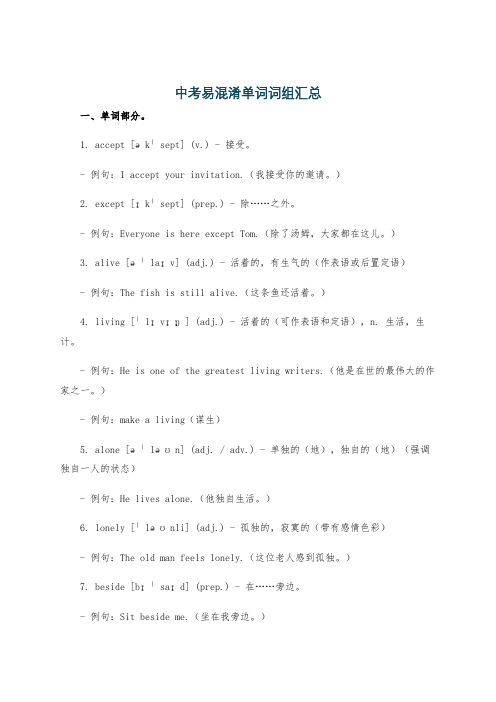
中考易混淆单词词组汇总一、单词部分。
1. accept [əkˈsept] (v.) - 接受。
- 例句:I accept your invitation.(我接受你的邀请。
)2. except [ɪkˈsept] (prep.) - 除……之外。
- 例句:Everyone is here except Tom.(除了汤姆,大家都在这儿。
)3. alive [əˈlaɪv] (adj.) - 活着的,有生气的(作表语或后置定语)- 例句:The fish is still alive.(这条鱼还活着。
)4. living [ˈlɪvɪŋ] (adj.) - 活着的(可作表语和定语),n. 生活,生计。
- 例句:He is one of the greatest living writers.(他是在世的最伟大的作家之一。
)- 例句:make a living(谋生)5. alone [əˈləʊn] (adj. / adv.) - 单独的(地),独自的(地)(强调独自一人的状态)- 例句:He lives alone.(他独自生活。
)6. lonely [ˈləʊnli] (adj.) - 孤独的,寂寞的(带有感情色彩)- 例句:The old man feels lonely.(这位老人感到孤独。
)7. beside [bɪˈsaɪd] (prep.) - 在……旁边。
- 例句:Sit beside me.(坐在我旁边。
)8. besides [bɪˈsaɪdz] (prep. / adv.) - 除……之外(还有),此外。
- 例句:Besides English, we also learn French.(除了英语,我们还学法语。
)- 例句:I don't like this dress. Besides, it's too expensive.(我不喜欢这条裙子。
它太贵了。
初中英语易混词辨析

初中英语易混词辨析-CAL-FENGHAI.-(YICAI)-Company One1中考易混淆的同义词总结1.say, speak, talk, tell这四个词都有“说”的意思,其用法差异主要在于各自强调的对象、内容不同。
(1)say的意思是“说”、“讲”、“说出”,是及物动词,强调“说”的内容。
不仅可指口头“说”,而且可指书面“说”。
eg: ① He said nothing to me. 他对我什么也没说。
② He said in his letter that he was getting on well with his life.他在信中说,他生活得很好。
固定搭配:say hello/good bye/sorry to sb. 向某人问候/告别/道歉say “ yes ” to sb . = agree with sb. 同意某人say “ no ” to sb. = disagree with sb. 不同意某人(2) speak表“说”、“讲”,它可以表示任何一种方式的“说话”。
它着重“说话”这一动作本身,而不强调所“说”的内容。
它通常为不及物动词,但它也可以作及物动词,后接the language、the truth、a word等,或接表示语言名称的名词。
eg: ①Please speak more slowly and clearly. 请说慢些和清楚些。
②Who is speaking 你是谁(打电话时用语)③Can you speak Japanese 你会讲日语吗固定搭配:speak to sb. 对某人说话speak highly of 称赞speak one’s mind 说心里话; 直言不讳(3) talk表示“交谈”、“谈话”,它指连贯地与人交谈,着重指说话的动作,而不强调说话的内容。
它一般用作不及物动词。
eg:①What are you talking about 你们在谈论什么②We are talking about the Chinese football match.我们在谈论中国足球比赛。
初中英语阅读理解易混淆词汇

初中英语阅读理解易混淆词汇1. Disappear vs. Appear- Disappear means to vanish or go out of sight. Example: The magician made the rabbit disappear.- Appear means to become visible or be seen. Example: The sun appears in the morning.2. Accept vs. Except- Accept means to agree to receive or take something. Example: She accepted the gift with gratitude.- Except means to exclude or leave out. Example: Everyone was invited to the party except for Tom.3. Advice vs. Advise- Advice is a noun that refers to recommendations or guidance given to someone. Example: I need some advice on how to study effectively.- Advise is a verb that means to give recommendations or counsel to someone. Example: The teacher advised the students to review their notes before the exam.4. Adapt vs. Adopt- Adapt means to adjust or modify something to fit a new situation. Example: The plants have adapted to the desert environment.- Adopt means to take on or choose something as one's own. Example: They decided to adopt a pet from the animal shelter.5. Affect vs. Effect- Affect is a verb that means to influence or have an impact on something. Example: The bad weather affected our travel plans. - Effect is a noun that refers to the result or outcome of something. Example: The new policy had a positive effect on the company's profits.6. Desert vs. Dessert- Desert refers to a dry and arid land. Example: The Sahara Desert is the largest desert in the world.- Dessert refers to a sweet course served at the end of a meal. Example: I ordered a slice of chocolate cake for dessert.7. Principal vs. Principle- Principal refers to the head of a school or a sum of money invested or borrowed. Example: The principal announced the new school policies.- Principle refers to a fundamental truth or belief. Example: He always stuck to his principles and never compromised.8. Resign vs. Re-sign- Resign means to voluntarily leave a job or position. Example: The CEO decided to resign from the company.- Re-sign means to sign a document or contract again. Example: I need to re-sign the lease for my apartment.9. Compliment vs. Complement- Compliment is a noun that means a nice comment or praise. Example: She received many compliments on her new dress. - Complement is a noun or verb that means something that completes or enhances something else. Example: The red shoes complemented her outfit perfectly.。
中考英语听力考试容易混淆的50个词语

中考英语听力考试容易混淆的50个词语中考英语听力考试容易混淆的50个词语中考英语听力容易混淆的50个词语听力考试时间宝贵,许多有用的信息稍纵即逝,最令人遗憾的莫过于听到一个自己摸棱两可的词或短语了,比如in a way和in the way,feel for sb.和feel for sth,通常会令我们举棋不定。
因此,在平日的训练当中,多多加强这些容易混淆的词语和短语的练习是十分有必要的,我们将分三次就一些易错的词语和表达法进行讲解,并附有例句,供大家加深理解。
1) a big time:尽兴,高兴的时刻e.g. I had a big time there.the big time:第一流,最高级e.g. Don’t worry, you are in the big time now.2) according to:按照,根据e.g. They were commended or criticized according to their work.according as:随……而定e.g. The thermometer rises or falls according as the air is hot or cold.3) admit to:承认e.g. I have to admit to a dislike for modern music.admit sb.(in) to:允许某人进入某地或加入某组织、行业e.g. They have admitted me into their club.4) all for:完全赞成e.g. I am all for holding a meeting to discuss it.for all:尽管e.g. They could not open the box for all their forces.5) all in all:总的说来e.g. All in all, it is a success.xall in:疲倦,筋疲力尽e.g. He was all in, but he stuck it out.6) as it is (was):照目前的.情况来看e.g. As it is, we shall be able to complete our task in time.as it were:可以说,姑且这样说e.g. He is, as it were, a walking dictionary.7) as much as:几乎,实际上e.g. By running away he as much as admitted that he had taken the money.as much…as:与……一样多e.g. It is as much our responsibility as yours.8) as well:也,还是……为好e.g. He gave me advice, and money as well.Since you have begun to do it, you may as well finish it.as well as:不仅……而且,除……之外e.g. With television, we see a picture as well as hearing sound.Small towns as well as big cities are being rapidly industrialized.9) at one time从前某个时期e.g. At one time, we met frequently.at a time:每次,一次e.g. You can borrow only two books at a time.10) attach to:属于,归因于e.g. No blame attaches to him.attach oneself to:参加,加入e.g. He attached himself to the group of climbers.11) be a credit to:为……增光e.g. I hope you will be a credit to your school.do credit to:为……增进荣誉e.g. This piece of work does credit to you.x12) bear in mind:记住e.g. I hope you will bear in mind all I am saying.have in mind:考虑e.g. Don’t give your confidence to others regarding the plan you have in mind.13) begin with:以……为起点e.g. He advised me to begin with something easy.to begin with:首先e.g. To begin with, we must consider the problem from all sides.14) build up:逐步建成,增强e.g. They are trying hard to build up an independent economy.He went for an ocean voyage and built up his health.build on:以……为基础,依赖e.g. Let’s build on your idea.We shall build on your supporting us.15) by day:在白天e.g. Most of them work by day and study by night.by the day:(指工作报酬等)按日计算e.g. Will you pay me by the day or by the hour?16) can but只好……罢了e.g. We can but try to make him see how unreasonable he has been.cannot but:不得不,禁不住e.g. I cannot but tell her the truth.(=I cannot help telling her the truth)17) come forth:出现,发行e.g. Many new things are coming forth..Do you know that a set of new stamps has come forth?come forward:自告奋勇,提出供讨论They have come forward with an offer to help.18)compare … to比拟(指出其中的相似点)e.g. Man’s life is often compared to a candle.compare … with:把……和……相比(指出其不同之处)e.g. He compared his camera with mine.19) consist in:包含在……中e.g. Happiness consists in good health.consist of:由……组成e.g. The apartment consisted of two rooms and a kitchen.20) end on:两端相碰,正对e.g. The two ships collided each other end on.We shouldn’t place the bicycles end on.on end:竖着,连续地,不断地e.g. Place the box on end.She often works for 20 hours on end.21) familiar to:某事为某人熟知e.g. There were facts not familiar to me.familiar with:熟悉或通晓某事e.g. He is familiar with English, German and French..22) feel for sb.:同情某人,为某人难过e.g. I feel for you in your sorrow.feel for sth:(用手、脚、棍子等)摸索,寻找某物e.g. She felt under the pillow for her watch.23) for a moment:片刻,一会儿e.g. She was silent for a moment, weighing in her mind the pros and cons.for the moment:此刻、暂时e.g. I cannot recall his name for the moment.24) get down:下去,下来;写下来Here’s the telephone number I got down for you.get down to:认真着手进行处理e.g. It is no good shirking the job, it will have to be got down to.25) get into trouble with sb.:遭到某人的(训斥等)e.g. Poor Tom is always getting into trouble with the boss.get sb. into trouble:使某人陷入困境e.g. The letter got me into trouble.26) give sb. a hand:帮助某人或参与某人做某事e.g. Give me a hand with the cleaning, please.give sb. one’s hand:与某人握手e.g. She gave me her hand and wished me a good trip.27) go through:检查,搜查;通过,穿过e.g. They went through our luggage at the customs.It took us a whole week to go through the great forest.go through with:把……坚持到底e.g. We should go through with the experiment now we’ve started.28) good for:有益于e.g. This book is good for your English study.for good:永久地e.g. The lost money was gone for good.29) have a fancy for:爱好,喜爱e.g. She has a fancy for nice clothes.have a fancy that:猜想,认为e.g. I have a fancy that he will come tonight.30) head up:领头;领导e.g. A band headed up the parade.Mr. Jones will head up the new business.e.g. Heads up, now! You can do better than that.31) in a way:在某种程度上e.g. In a way, it is an important book.in the way:妨碍,挡路I will visit you next weekend if there is nothing in the way.32) in black:穿黑色衣服e.g. Arabian women are always dressed in black clothes.in the black:赢利,赚钱New production methods put the company in the black.33) in charge of:负责e.g. Who is in charge of this work?in the charge of:照护e.g. The patients are in the charge of the nurse.34) in hand:控制e.g. There was a little rioting, but the police soon had the situation in hand.hand in:递交,交给e.g. He handed in his resignation in protest against it.35) in one’s honor:向……表示敬意或感谢e.g. The day was kept as a holiday in honor of victory.on one’s honor:用人格担保e.g. We were on our honor not to cheat on the exam.36) in possession of:占有e.g. He is in possession of this house.in the possession of:被占有e.g. The keys are in the possession of the door keeper.37) in spirit:在内心,在精神上e.g. In spirit, at least, these laws were very fair.in spirits:情绪或心情(好、坏等)e.g. He is in poor spirits because of his failing in the exam.38) keep up:继续,保持e.g. They entered into a correspondence which was kept upfor almost ten years.keep up with:与……齐步前进,跟上e.g. With their help, he has kept up with the class.39) look about:环视e.g. He looked about him with great interest.look about for:四处寻找e.g. She was looking about for the key she had just lost.40) look up:向上看e.g. He looked up and nodded to me.look up to:尊敬e.g. It must be rewarding to be looked up to by so many people.41) make one’s way:开路e.g. As soon as he saw us, the teacher made his way through the crowd to greet us.make one’s way to:向……走去e.g. In the evening we made our way to the appointed meeting place.42) measure to:测量到某一精度e.g. Measure this part to mm.measure up to:够得上,可以匹敌e.g. The new techniques measure up to advanced world standard.43) more than:很,非常e.g. He was more than upset by the accident.more…than:比……更e.g. I regarded her more highly than me.44) much as:虽然xe.g. Much as I should like to go, I can’t go right now.as much:同样的或同样多少的e.g. You have always helped me and I will always do as much for you.45. no less than:不亚于,竟达……之多e.g. There were no less than one hundred people at the meeting.not less than:不比……差,至少e.g. There were not less than one hundred people at the meeting.46. no more than:同样不;仅仅,只有e.g. This book is no more interesting than that one.It is no more than empty talk.not more than:不比……更,不如;至多e.g. He is not more clever than you are.There were not more than 5 factories in our city before liberation.47. on sale:出售的;廉价出售e.g. Many new farm tools are on sale in this store.I got this book on sale; it was very cheap.xfor sale:出售的,上市的e.g. I shall put these goods up for sale.在作“出售的”的意思的时候,on sale和for sale还是有一些不同的,一般来说,for sale多指物主亲自或委托代理人经手出售,而on sale通常表示店里的货物是供出售的。
初中英语易混淆的词语辨析
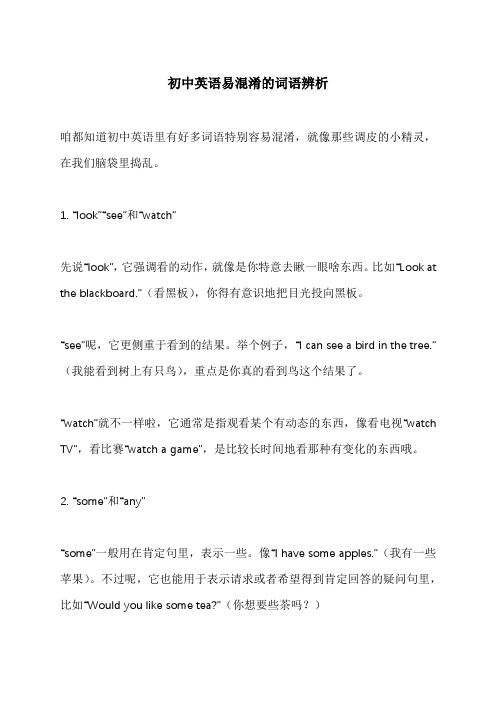
初中英语易混淆的词语辨析咱都知道初中英语里有好多词语特别容易混淆,就像那些调皮的小精灵,在我们脑袋里捣乱。
1. “look”“see”和“watch”先说“look”,它强调看的动作,就像是你特意去瞅一眼啥东西。
比如“Look at the blackboard.”(看黑板),你得有意识地把目光投向黑板。
“see”呢,它更侧重于看到的结果。
举个例子,“I can see a bird in the tree.”(我能看到树上有只鸟),重点是你真的看到鸟这个结果了。
“watch”就不一样啦,它通常是指观看某个有动态的东西,像看电视“watch TV”,看比赛“watch a game”,是比较长时间地看那种有变化的东西哦。
2. “some”和“any”“some”一般用在肯定句里,表示一些。
像“I have some apples.”(我有一些苹果)。
不过呢,它也能用于表示请求或者希望得到肯定回答的疑问句里,比如“Would you like some tea?”(你想要些茶吗?)“any”大多用在否定句和疑问句里。
比如“I don't have any money.”(我没有钱),“Do you have any questions?”(你有任何问题吗?)3. “few”“a few”“little”“a little”“few”和“a few”是用来修饰可数名词的。
“few”表示几乎没有,有否定的意思。
例如“Few students can answer this difficult question.”(几乎没有学生能回答这个难题)。
“a few”就是有一些,是肯定的,像“There are a few books on the desk.”(桌子上有一些书)。
“little”和“a little”是修饰不可数名词的。
“little”表示几乎没有,否定的,例如“There is little water in the glass.”(杯子里几乎没有水了)。
- 1、下载文档前请自行甄别文档内容的完整性,平台不提供额外的编辑、内容补充、找答案等附加服务。
- 2、"仅部分预览"的文档,不可在线预览部分如存在完整性等问题,可反馈申请退款(可完整预览的文档不适用该条件!)。
- 3、如文档侵犯您的权益,请联系客服反馈,我们会尽快为您处理(人工客服工作时间:9:00-18:30)。
初中英语易混淆的词语affect/effect1)affect——affected——affected及物动词对 , 影响,感动( 人的 ) 心,使感动例句:① The noise from the street affected our study.( 马路上的噪音影响我们学习。
)②Her story affected us deeply.beat/hit/strike1)beat —— beat —— beaten(连续地 )打; 击败;( 心)跳动例句:① My heart is beating fast.( 我的心跳得很快。
)②They beat us in the match.( 在这次比赛中,他们把我们击败了。
)③The rain was beating on the windows.( 雨点敲打着窗子。
)2)hit打;击中;想出(后接on)例句:① The football hit him in the eye.( 足球打在他的眼睛上了。
)②He hit on a good idea.( 他想出了一个好主意。
)③He hit his head hard on the floor when he fell down.( 当他倒下时,头重重地碰到地板上。
)3)strike——struck——struck打; 敲; 打动 ( 心); 擦( 火柴 ); 报时 ; 突然想到,用途较广。
例句:① Strike while the iron is hot.( 趁热打铁。
)②Don't strike the man with a stick.( 不要用棒子打那个男人。
)join/join in/take part in/attend1)join 及物动词加入 ( 团体,组织,参军 ) 、同 ,, 一起干或玩、连接例句:① I joined the Party in 1975.( 我 1975 年入党。
)②His brother joined the army two years ago.( 两年前他哥哥参军。
)③They are planning to join the two towns by a railway.( 他们在计划用一条铁路把两个镇连接起来。
)2)join in参加(某些活动)例句:① May I join in your discussion?( 我可以参加你们的讨论吗?)②Many people join in the game every year.( 每年许多人参加这个游戏活动。
)③He joined in the work without a second thought.( 他未加思索地参加了那项工作。
)3)take part in参加(群众性活动,会议等)参加者持积极态度,起一份作用。
例句:① A lot of students took part in the thorough cleaning yesterday.( 昨天许多学生参加大扫除。
)②A lot of college students took part in the movement last year.( 去年很多大学生参加了那个运动。
)4)attend 出席,参加,到场 ; 上学例句:① Did you attend the meeting last week?( 上星期你出席会议了吗 ?)②He was ill so he didn't attend his classes.( 他生病了,所以没上学。
)注意: attend的词语搭配attend a ceremony参加典礼attend a funeral参加葬礼attend a lecture听演讲attend a concert听音乐会attend church上教堂choose/select/elect/pick out1)choose —— chose—— chosen挑选 ; 选拔 ; 选择,指凭自己的判断力在人或物中进行挑选,而不强调精选。
例句:① I'd like to choose a new tie for me.( 我想给自己挑一条新领带。
)②I want to choose her a nice present.( 我想要挑选一份精美的礼物送给她。
)③The football players chose him as their team leader.( 足球队员们选他当队长。
)2)select 精选 ; 挑选 ; 选定,强调慎重考虑后的选择。
例句:① The farmer taught us how to select seeds.( 这位农民教我们如何选种。
)②She was selected from among many applicants.( 她是从许多报名者中选拔出来的。
)③Have you read selected works of Lu Xun?( 你读过《鲁迅选集》吗 ?)3)elect 选举 ; 推选例句:① We elected her monitor.( 我们推选她为班长。
)②We elected him mayor.( 我们选他为市长。
)③pick out 认出 ; 挑出 ; 挑选 ; 多用口语例句:① I picked out an old friend in a crowd.( 我从人群中认出了一位老朋友。
)②She picked out the shoes that match the dress.( 她选出搭配那件衣服的鞋子。
)reach/arrive/get to1)reach —— reached —— reached及物动词到达,不加to 等分词。
例句: They will reach Shanghai tonight.( 今晚他们将抵达上海。
)2)arrive——arrived——arrived不及物动词到达,加介词in( 大地方 )at小地方。
例句:① I'll phone you when I arrive in New York.( 我到纽约后会给你电话。
)②What time will they arrive at the airport?( 他们什么时候会到达机场 ?)3)get —— got —— gotten(got)to。
不及物动词需加上to 加上地点表示到达,但接地点副词时不加例句:① What time does the train get to Beijing?( 火车什么时间到达北京?)②When I set to Japan, I'll write to you.( 我到了日本就给你写信。
)③They got home safely.( 他们平安到家。
)注①:此处home是副词不能加to 。
注②:“到达” reach=arrive at (in)=get to到达上海到达家/这里/那里win/beatwin─won─wonwin a prize得到奖品win a war打了胜仗win a game赢得比赛win an election选举获胜例句:① Our team won the same 3 to 2 last night.( 昨晚我们队以 3 比 2 赢了比赛。
)②Who do you think will win the beauty contest?( 你认为那场选美谁会获胜 ?)③beat ─beat ─beatenbeat 是打败了对手例句:① He beat me in the race.( 他在赛跑中赢了我。
)②We have beaten their team for 3 years.( 我们已连续 3 年打败他们的球队。
)③My heart beat fast at the sight of her.( 一看见她,我的心跳就加快。
)fall/feel/fell/fail/fall─fell─fallen落下; 跌倒fall asleep睡着/fall behind落后例句:① An apple fell to the ground.( 一个苹果落在地上。
)②Be careful on the ice or you will fall.( 在冰上要小心,否则你会跌倒。
)feel ─felt ─feltfeel like+doing sth.想要;feel sleepy.想睡例句:① Can you feel your heart beat violently?( 你能感觉到你的心在猛烈地跳动吗?)②Both my legs didn’t feel.( 我的双腿没有感觉。
)③I suddenly felt a pain in my back.( 我突然感到背部疼痛。
)④Do you feel like taking a walk?( 你想不想去散步 ?)fell ─felled ─felled 砍伐例句: A lot of trees were felled last night.( 昨晚很多树被人伐倒了。
)fail─failed─failed失败例句: He has failed in English exam again.( 他英语考试又没及格。
)lend/ 借出 borrow1)lend+ 人 +物 =lend+ 物 +to+ 人例如:① Please lend me your dictionary.=Please lend your dictionary to me.( 请把你的字典借给我。
)②I will lend you $200, but I can’t lend money to him.( 我借给你200 美元,但我不能借钱给他。
)borrow 借入borrow+ 物 +from+ 人①She has borrowed a lot of books from the school library.( 她已从学校的图书馆借了很多书。
)②He often borrows money from me.( 他经常从我这儿借钱。
)rise/raise/arise/arouse/rouse1)rise(太阳、月亮)升起,起来;(物价)上涨;(水)高涨rise —rose — risen — rising例句:①Everyone knows that the sun rises in the east.( 每人都知道太阳是从东方升起。
)②Prices have risen quickly.( 物价快速上涨了。
